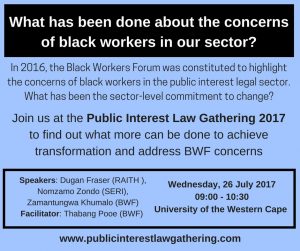In this blog, Palesa Madi, Bertha Justice Alumna at the Centre for Applied Legal Studies, summarizes the historic rise of the Black Workers Forum (BWF), and their hopes and aspirations a year on from its inception.
The Public Interest Law Gathering (PILG) is an annual event, supported by the Bertha Foundation, where lawyers, students, social movement leaders and academics gather to share knowledge and discuss issues related to public interest law. It’s also the birthplace of the BWF.
 BWF members at the the Black Workers Forum Summit, 2016
BWF members at the the Black Workers Forum Summit, 2016Before the rise of the Black Workers Forum in 2016 there had been several panel discussions at previous Public Interest Law Gatherings on the need for transformation of the legal profession, a profession widely criticized for failing to adequately represent the racial and gender diversity inherent in South Africa.
At PILG 2016, following yet another panel discussion on this need, a number of black workers from South Africa’s top public interest legal organizations, represented at PILG, handed over a memorandum of demands to their directors.
In this brave and historic moment, the black workers called for genuine transformation in the public interest law sector. The black workers, who at the time referred to themselves as the Black Young Professionals (BYP) and have now named themselves the Black Workers Forum (BWF), demanded that their employers put in place actions and policies to drive equality in the sector: policies for transparency in salaries and/or pay scales; and policies on staff development and gender empowerment, aimed at breaking down the glass ceiling. The Forum also called for gender, race, and cultural sensitivity training; for policies on how to attract, recruit, and retain persons living with disabilities and for policies on how to recruit African Foreign Nationals.
In line with these demands, the BWF at PILG 2016 called for directors of the organizations to adopt policies and measures that will ensure that black staff members (regardless of the position they occupy and/or work they do) enjoy a diverse and egalitarian work environment.
Following the handover of the memorandum of demands at PILG 2016, the BWF met with the directors of the respective public interest legal organizations. At this Directors’ Meeting, the BWF set out their identity and objectives, fleshed out their demands and requested that directors make available existing transformation-related policies.
After the meeting, the Forum analyzed responses and the organization’s policies, looking for gaps, and making recommendations on how to create more diverse and equal working environments for black workers. In addition, the BWF made recommendations to donors on the role they can play in transforming the sector.
The BWF’s latest effort to realize the transformation they seek is through a panel at this year’s Public Interest Law Gathering. On 26 July 2017, the BWF is hosting a plenary panel at PILG titled “Transformation in the Public Interest Law Sector: Where Do We Go from Here?” The panel is on the issues the BWF has raised since its formation and how the sector (including directors and donors) have responded to their demands. Further, the panel will afford relevant stakeholders an opportunity to express their views on their understanding, commitment to, steps taken, and method of working towards achievement of transformation in the public interest law sector.
This pivotal plenary session will be an opportunity for BWF members to highlight systemic issues inherent in the sector and provide feedback to donors and directors following the Directors’ Meeting and the period of analysis earlier in the year. The Forum is excited to hear stakeholders’, donors’, directors’ and colleagues’ commitment and thoughts on how together we can achieve transformation in the sector.
The Black Workers Forum hopes that this panel at PILG 2017 will result in an honest and robust discussion. They hope that there is critical reflection and consideration of the issues raised and a chance to expand on some of the responses received from public interest law organizations within the PILG network. The Forum hopes that this panel will not be just another ‘talk-shop’ discussion on transformation in theory but that, through the panel innovative and groundbreaking solutions will be discussed and that such solutions will be implemented urgently by directors and donors – i.e. those who have the power to do so.

PILG takes place this year from 24 – 26 July at the University of the Western Cape, South Africa and is being coordinated by a number of South Africa’s prominent public interest legal organizations: the Centre for Applied Legal Studies (CALS), Centre for Environmental Rights (CER), Equal Education Law Centre (EELC), Lawyers for Human Rights (LHR), the Legal Resources Centre (LRC), ProBono.Org, Section27, the Socio-economic Rights Institute of South Africa (SERI), the Southern Africa Litigation Centre (SALC), Students for Law and Social Justice (SLSJ), the University of the Witwatersrand School of Law, and Women’s Legal Centre (WLC).

Palesa Madi
Bertha Justice Alumna at Centre for Applied Legal Studies
Follow: @PalesaMadi1 and @CALS_ZA on Twitter
Article Tags: Bertha Justice Alumni / Black Lawyers / CALS / women lawyers